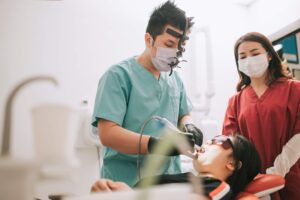Healthy Soft Foods to Enjoy After Oral Surgery

Any surgery or invasive procedure involving the mouth is going to be a little bit painful. However, for most people who have undergone oral surgery, eating normal food can also be a challenge for a while. This type of surgery requires a “restricted diet,” because chewing and swallowing will be uncomfortable during recovery period. In addition to the pain, the healing process may take some time as well. Therefore, if you underwent oral surgery recently it would be best if you try some soft foods to eat after oral surgery before returning to your regular diet.
Reach for Nutrient-Rich Soft Foods
Since you are not allowed to chew solid food after your oral operation, your body needs nutrient-rich soft foods in order not to suffer from malnutrition or any other deficiency. It’s important to understand the difference between soft food and pureed or blended foods, since it is primarily about texture rather than consistency.
A dentist will suggest you a list of good foods that are rich in vitamins and minerals but also easy to eat without chewing. The exact choice depends on the type of procedure you had, but all of them should be nutritious enough for your body to stay healthy.
Even so, some dentists may allow you to switch back to regular diet after some time if your recovery is not problematic at all.
Soft foods are usually advised after wisdom teeth removal since they do require chewing more than usual before swallowing them properly. You can try mashed potatoes with extra gravy sauce, cheese over pasta or rice dishes, or other types of food, which are simple to eat without teeth.
Strive for Foods That Fill
Avoid having foods that are too thin or watery since it will be hard for you to fill your stomach after surgery even with soft foods. Starchy dishes are good choices because they are filling and nutritious at the same time. Yogurt is also an excellent choice as long as it’s full fat; try having some warm cereal with milk in order to feel full longer after surgery.
Recover Faster with Broth-Based Soups
Broth-based soups like chicken noodle soup can help your body recover faster due to several reasons: they’re easy to digest (especially when you aren’t allowed to chew) and they provide high amounts of nutrients like vitamins C and A, potassium, zinc and magnesium. The best part is that you can add different ingredients such as pasta, rice, or carrots in order to boost the taste and the body’s ability to digest food.
Meat Can Be an Option, But Take Care
If you feel like eating meat, then take a look at the dentist’s list of soft foods and choose chicken, or a soft, boneless fish type since they are easy to chew and eat without engaging your teeth. You can also incorporate certain pureed, ground, and canned meats to add variety and nutrients to your diet. As long as your meat comes in soft pieces and is served in watery sauce, meat is an excellent choice after oral surgery.
Other Nutritious Food Choices After Oral Surgery
Eggs in all their varieties are a great choice after oral surgery. Fruit salad, yogurt with fresh fruits, pancakes, hot cereals, spreads and dips, beans, mashed potatoes are great options if your dentist says it’s OK to have a regular diet. Fruit smoothies or milkshakes can also be a good choice as long as they’re not too thin and you don’t add any ingredients that increase the chances of choking or vomiting (like ice cubes).
Foods to Avoid After Oral Surgery
The dentist should provide you with a checklist of soft foods for after oral surgery, which you should check off while trying to eat one meal at the same time every day. The list contains all types of food you can try without interfering with recovery process. Make sure to ask your dentist if you’re allowed to have them before eating.
Some foods to avoid after oral surgery include:
- Anything that requires excessive chewing.
- Hard or sticky foods.
- Lettuce, carrots, apples, or nuts.
- Chips, crackers, seeds.
- Dried fruits, jerkies, bacon, or uncooked noodles.
- Raw vegetables.
- Candies and gum.
- Dense breads or pastries.
People who had wisdom teeth removal may switch back to regular diet in about 10 days. Others who had more complex procedures usually avoid food that requires chewing for two weeks. If your dentist doesn’t mention anything about returning to the previous diet, then it would be best to strictly follow all dentist’s instructions.
At the end of the day, the list of foods for after dentist surgery is a guide that shows you what to avoid or include in your diet depending on dentist preferences. Soft foods may not be as tasty, but they’re nutritious and safe as long as you follow all dentist guidelines to avoid post-operative complications. Contact Beyond Dentistry Laser Center to get answers to all your post-oral surgery diet questions. Our friendly team is here when you need us!
